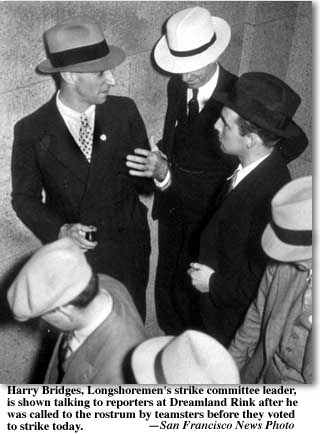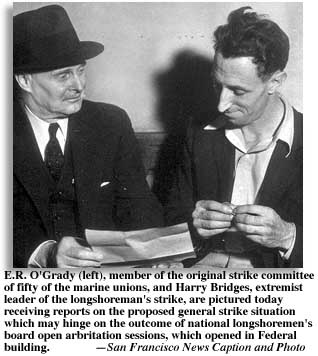
George Kidwell, secretary of the General Strike Committee, July 15, 1934
In this critical period for San Francisco and the Bay Region, a confusion exists in many minds as to the causes of the present labor emergency. Will you permit us this opportunity for clarification of the situation, and a reassurance to you-- Primarily we wish to discuss the present procedure of organized labor which unfortunately has become commonly designated as a general strike. It is true that many labor unions in San Francisco have been forced to embark on a unified strike action. Partly this is coincidence, mainly it is because the attack upon organized labor which has forced this defensive strike action is one that threatens, broadly and decisively, all of the components of organized labor, not just the members of one or a few union classifications or crafts.
But the term "general strike," due to the confusion and instability in many
governments and industrial systems throughout the world, has come to
connote certain elements and certain definite aims which are completely
foreign to the minds of American organized labor. To make this more
specific, let us emphasize that the San Francisco strike situation includes
not in the slightest degree these ambitions which are often comprehended in
the term general strike:
In further discussion of factor "B" permit us to point out that it is exactly to support our traditional American legal and democratic institutions that these strikes have been thrust upon us. What are the ends to be attained in this strike movement? Correction of wages, hours or working conditions? Only in specific cases and in reference to certain definite union groups. The overwhelming cause which has forced San Francisco's men and women to leave their work is the unified and almost overwhelming attack of certain employer groups upon labor's rights to organize in their own unions and to bargain collectively through representatives of their own choosing.
The present acute situation is this. The national breakdown known as the
depression forced upon all America a new system for the production of the
nation's goods and services, a system wherein the old disorganized,
personally competitive businesses and procedure of employers had to be
discarded for methods of unity and co-operation by the employers in each
industry. Anti-
Now this placed in the hands of business leaders and industry owners a vast
new power which, unchecked, in irresponsible hands, would have resulted
in an overwhelming and unbearable penalty against the nation as a whole
for the advantage of the few, to consumers in prices pyramided under
monopoly, to labor in wage levels crushed down by unified monopolistic
action. To prevent top-
Thus the National Industrial Recovery act, the legal statutes of the United
States under which practically ALL employers of America now operate,
affirms the rights of unionization in words which no intelligent and fair-
But this legal right of organization the employers in many industries have flatly refused to accept: this right the government of the United States, beset by many problems in a changing world of political and economic turmoil, has not yet been able to force upon the recalcitrants among the employers. Even more, they have endeavored to use their own new, huge unified power to destroy the labor organizations which previously had been in existence. It is in defense against this catastrophe that the substantial and responsible labor unions of America are being forced to take action, action which now centers in the San Francisco strike series.
Do not mistake us. In San Francisco there are many fine
employers--
They, like labor, are innocent victims of the present emergency. They have
our sympathy and our most cordial regard. But it is an emergency in which
labor may protect itself in only one way--
To such employers the San Francisco catastrophe is merely an incident in their drive to break the power of organized labor. The welfare or distress of the citizens of this city is of no importance. They are quite willing for San Francisco to make any sacrifice if their command over their workers is to be strengthened through the destruction of this part of the labor movement. Let us reiterate: The unions in this crisis are doing everything in their power to see that no vital service shall be denied the community. Every union man in San Francisco is a citizen as well as a worker; we, like those not in the unions, have families and homes depending upon the continuance of the intricate machinery of production and distribution which is vital to city life.
The union man, like other citizens, seeks to protect this system. He merely
happens now to be in the front line, buffeted by the full force of an
un-
Return to the Museum's General Strike Page. |
 It seems almost unthinkable that San Francisco organized labor should find
it necessary to deny such motives as these. Yet certain leaders of the attack
upon us which has forced this strike action have sought for their selfish
ends to prey upon the patriotism of the people, to prejudice the city and the
nation against organized labor by false declarations that the present
situation is due to "red" or revolutionary impulses. Just the most casual
glance at conditions proves how untrue these statements are. In specific
discussion of the two factors listed above as often considered a part of the
term "general strike," let us point out:
It seems almost unthinkable that San Francisco organized labor should find
it necessary to deny such motives as these. Yet certain leaders of the attack
upon us which has forced this strike action have sought for their selfish
ends to prey upon the patriotism of the people, to prejudice the city and the
nation against organized labor by false declarations that the present
situation is due to "red" or revolutionary impulses. Just the most casual
glance at conditions proves how untrue these statements are. In specific
discussion of the two factors listed above as often considered a part of the
term "general strike," let us point out:
 May we also point out that it is not labor, but instead the leaders of the
anti-
May we also point out that it is not labor, but instead the leaders of the
anti-